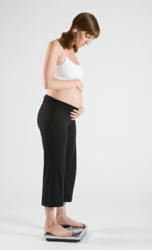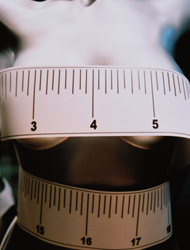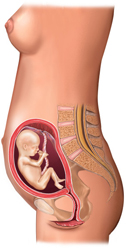CHANGES TO MUM
By 17 weeks of your pregnancy you may be feeling your baby move. However you may not realise that it is in fact your baby moving due to the erratic and fairly irregular feeling. When you start to feel movement will vary from woman to woman and in particular if this is your first pregnancy.
You should not expect to feel real kicking just yet, it will more so be fluttery movements, kicks will start in about a month (trust me, you will know these are your baby for sure) and daddy can even feel some of these from the outside if they are large enough.
Your emotions might be running wild and start to feel a little down about your body at this stage in your pregnancy. You are most likely to start gaining some weight at 17 weeks which can make you worry about your changing body. Take time out for yourself to feel good about yourself and also to help you de-stress.
It is important to keep your stress levels down as they can have a massive impact on your pregnancy and childbirth. High stress levels can result in the increase of CRG or corticotrophin-releasing hormone that has been linked to preterm labour.
During pregnancy you know that your emotions are all over the place and you can become irrational. Talk about how you are feeling and if you do find that you are not coping with your stress and emotions, speak to your obstetrician.
You may be feeling that everything is expanding, as your breasts increase in size, so does the areola around your nipples. This may last as long as 12 months after the birth of your baby but will fade along with the linea nigra on your tummy (that you may or may not have).
At 17 weeks of pregnancy you may have noticed more vaginal discharge and this will continue during the final half of the pregnancy. This discharge is a milky or clear colour and will be odourless, referred to as leucorrhoea. A panty liner will combat this problem and absorb the moisture of the discharge.
If you do have any associated itching or burning with this discharge you may have an infection, likewise if there is a smell from the discharge. Constantly monitor all changes to your body and if you feel that it is not a normal and related pregnancy change, contact your medical provider for advice.
CHANGES TO BUB
At approximately 13 cms in length from crown to rump your baby weighs around 140 grams. If you were to hold your baby in week 17 of your pregnancy he/she would fit into the palm of your hand.
Your baby’s ears continue to develop as the tiny bones inside the ear hardens. The baby will begin to hear your voice, your heart and your digestion rumbling!! Pregnant women find that from this point on playing music to their belly and talking to their baby is very comforting.
Try singing to your baby and having little chats as there is some evidence that suggests your baby responds to the sounds outside even while in the womb. You may even find that after the birth of your baby they recognise those same sounds, songs and your voices, comforting your baby and making them feel safe.
It is also said that there is positive and calming effects associated with touch. As you start to feel your baby kick and move, you may consider touching and rubbing your tummy, not only to comfort your baby but to help with the bonding process both now and after the birth.
The placenta is firmly attached to the uterine wall and by week 17 the placenta has grown to approximately 1 cm in thickness. As it continues to grow it will reach 20 to 25 cms across and weight about 500g at term. Your baby continues to receive oxygen via the placenta and as the lungs develop your baby breathes the amniotic fluid.
The placenta makes an increased amount of hormones throughout the pregnancy some of which helps to keep your uterus healthy and will be essential in preparation of your breasts to assist with breastfeeding your baby when born.
Remember that your ability to feel your baby’s movements will depend on the thickness of your abdominal wall, placental location and your sensitivity. If your placenta is located at the front of the uterus it can often pad some of the baby’s kicks and will often take longer for you to feel the movements through the placenta.
















